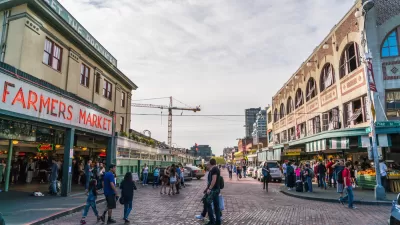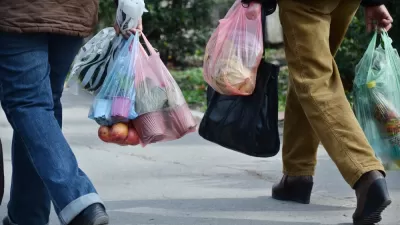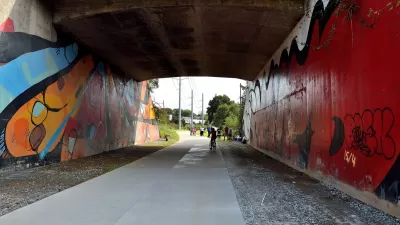Urbanites' complaints about gentrification have much in common with suburbanites' complaints about commutes. Scarcity due to the ridiculous amount of land zoned for single-family housing deserves as much blame for displacement as gentrification.

"The only thing worse than listening to suburbanites bitch about being stuck in traffic? Listening to local politicians pretend they can actually do something to "Make Commutes Great Fast Again."
"Way, way back in the '50s and '60s, people got it into their heads that they had a constitutional right to live in the suburbs and drive in or through the center of a city—to jobs, to stores, to stadiums, to hookers, to suburbs on the other side of the city—going seventy miles an hour. Our local politicians can't bring themselves to tell these entitled shits the truth: It's never going to be the 1960s around here again, when expressways were expressways, not parking lots. We can't build our way out of this. We can only build alternatives to cars, aka mass transit. (Preferably rapid transit, which is grade-separated transit. Without taking lanes away from cars, which we aren't going to do, BRT is not rapid transit. It's an oxymoron.) Mayors and city council members and county council members in cities with with [sic] functioning mass transit systems don't have to make serious faces and reassure entitled drivers that they're gonna do something to speed up their commutes.
"At roughly same time suburbanites got it into their heads that they're entitled to drive through the center of the city at 70 MPH, urbanites got it into their heads that the center of the city is cheapest place to live. ("Downtown, where the folks are broke!") And for a while the center of the city was the cheapest place to live. But that's no longer the case."
More from Dan Savage's article after the jump.
FULL STORY: Doing Something Real About Gentrification and Displacement

Alabama: Trump Terminates Settlements for Black Communities Harmed By Raw Sewage
Trump deemed the landmark civil rights agreement “illegal DEI and environmental justice policy.”

Study: Maui’s Plan to Convert Vacation Rentals to Long-Term Housing Could Cause Nearly $1 Billion Economic Loss
The plan would reduce visitor accommodation by 25% resulting in 1,900 jobs lost.

Why Should We Subsidize Public Transportation?
Many public transit agencies face financial stress due to rising costs, declining fare revenue, and declining subsidies. Transit advocates must provide a strong business case for increasing public transit funding.

Wind Energy on the Rise Despite Federal Policy Reversal
The Trump administration is revoking federal support for renewable energy, but demand for new projects continues unabated.

Passengers Flock to Caltrain After Electrification
The new electric trains are running faster and more reliably, leading to strong ridership growth on the Bay Area rail system.

Texas Churches Rally Behind ‘Yes in God’s Back Yard’ Legislation
Religious leaders want the state to reduce zoning regulations to streamline leasing church-owned land to housing developers.
Urban Design for Planners 1: Software Tools
This six-course series explores essential urban design concepts using open source software and equips planners with the tools they need to participate fully in the urban design process.
Planning for Universal Design
Learn the tools for implementing Universal Design in planning regulations.
Caltrans
Smith Gee Studio
Institute for Housing and Urban Development Studies (IHS)
City of Grandview
Harvard GSD Executive Education
Toledo-Lucas County Plan Commissions
Salt Lake City
NYU Wagner Graduate School of Public Service





























